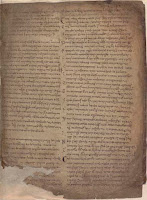 |
| Edinburgh, National Library of Scotland, Adv. MS 72.1.5 (15th cent.?), fol. 10r |
To see the face of God;
It were my soul's desire
To rest in His abode.
It were my soul's desire
To study zealously;
This, too, my soul's desire,
A clear rule set for me.
It were my soul's desire
A spirit free from gloom;
It were my soul's desire
New life beyond the Doom.
It were my soul's desire
To shun the chills of hell;
Yet more my soul's desire
Within His house to dwell.
It were my soul's desire
To imitate my King,
It were my soul's desire
His ceaseless praise to sing.
It were my soul's desire
When heaven's gate is won
To find my soul's desire
Clear shining like the sun.
Grant, Lord, my soul's desire,
Deep waves of cleansing sighs;
Grant, Lord, my soul's desire
From earthly cares to rise.
This still my soul's desire
Whatever life afford,—
To gain my soul's desire
And see Thy face, O Lord.
Trans. Eleanor Hull, The poem-book of Gael: translations from Irish Gaelic poetry into English prose and verse (London: Chatto & Windus, 1912), 142-143.
It were my mind's desire to behold the face of God. It were my mind's desire to live with Him eternally.
Trans. Gerard Murphy: "Anonymous [11th century]" | "My mind's desire," trans. Gerard Murphy, in Gerard Murphy, Early Irish lyrics: eighth to twelfth century (Oxford: Clarendon Press, 1956), 58–61 (Middle Irish—English, with Notes), 199–200 (Introduction). The 15th-century manuscript depicted above—Edinburgh, National Library of Scotland Adv.MS.72.1.5—is the one that Murphy, following Mackinnon, dates to the 14th century ("MS. No. 1 of the Kilbride Collection ('K')"). Next earliest would appear to be London, British Library, MS Add. 30512 (15th-16th century).
It were my soul's desire
To behold the face of God,
It were my soul's desire
Eternally to live with Him.
It were my soul's desire
Studiously to read little books,
It were my soul's desire
To live under a clear rule.
It were my soul's desire
To be cheerful towards all,
It were my soul's desire
Triumphantly to rise after Doom.
It were my soul's desire
. . . the body after triumph,
It were my soul's desire
Not to know cold Hell.
It were my soul's desire
To dwell in the clear mansions of the King,
It were my soul's desire
To glitter as the sun.
It were my soul's desire
To be for ever in the company of the King,
It were my soul's desire
(To listen to) many strains throughout the ages.
It were my soul's desire
To forsake this world,
It were my soul's desire
To behold the face of God.




